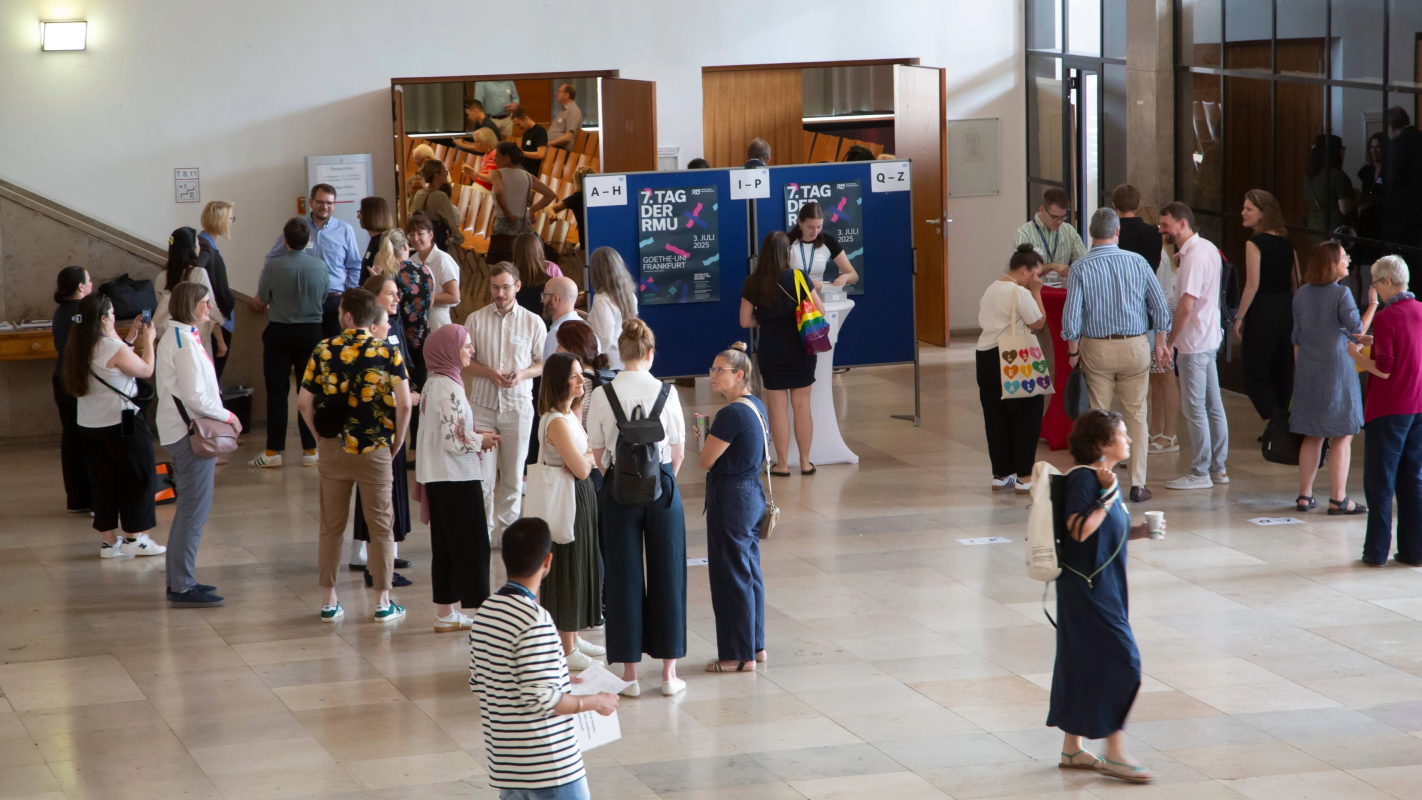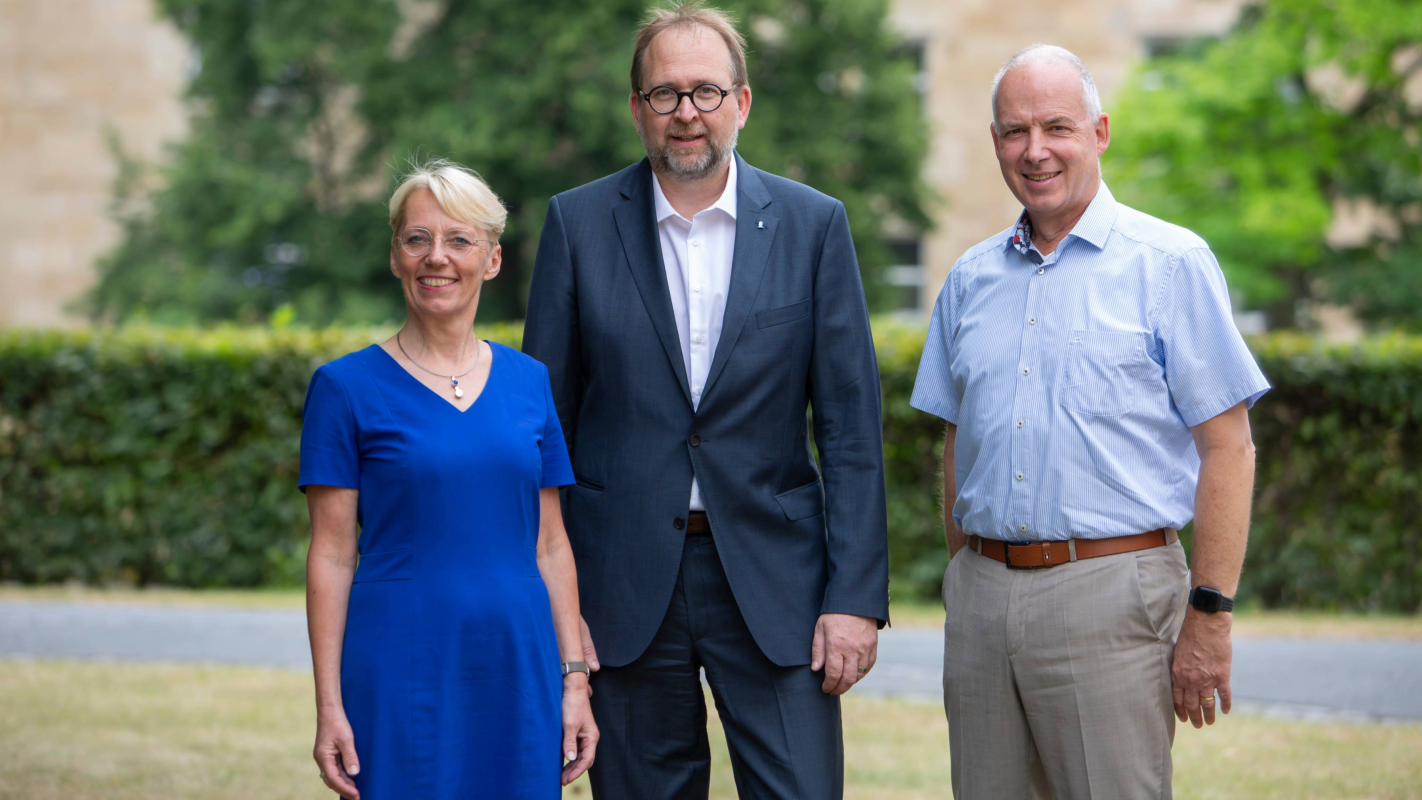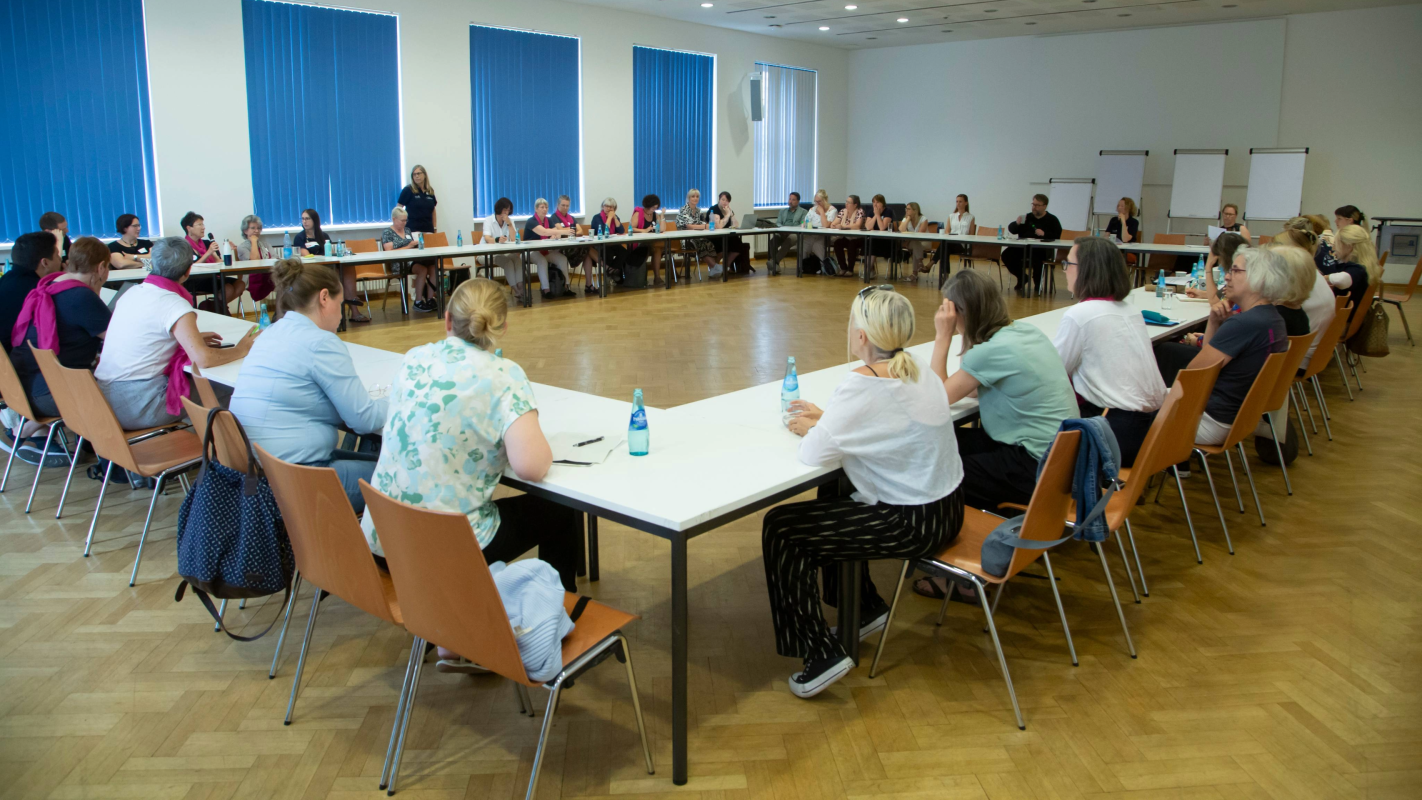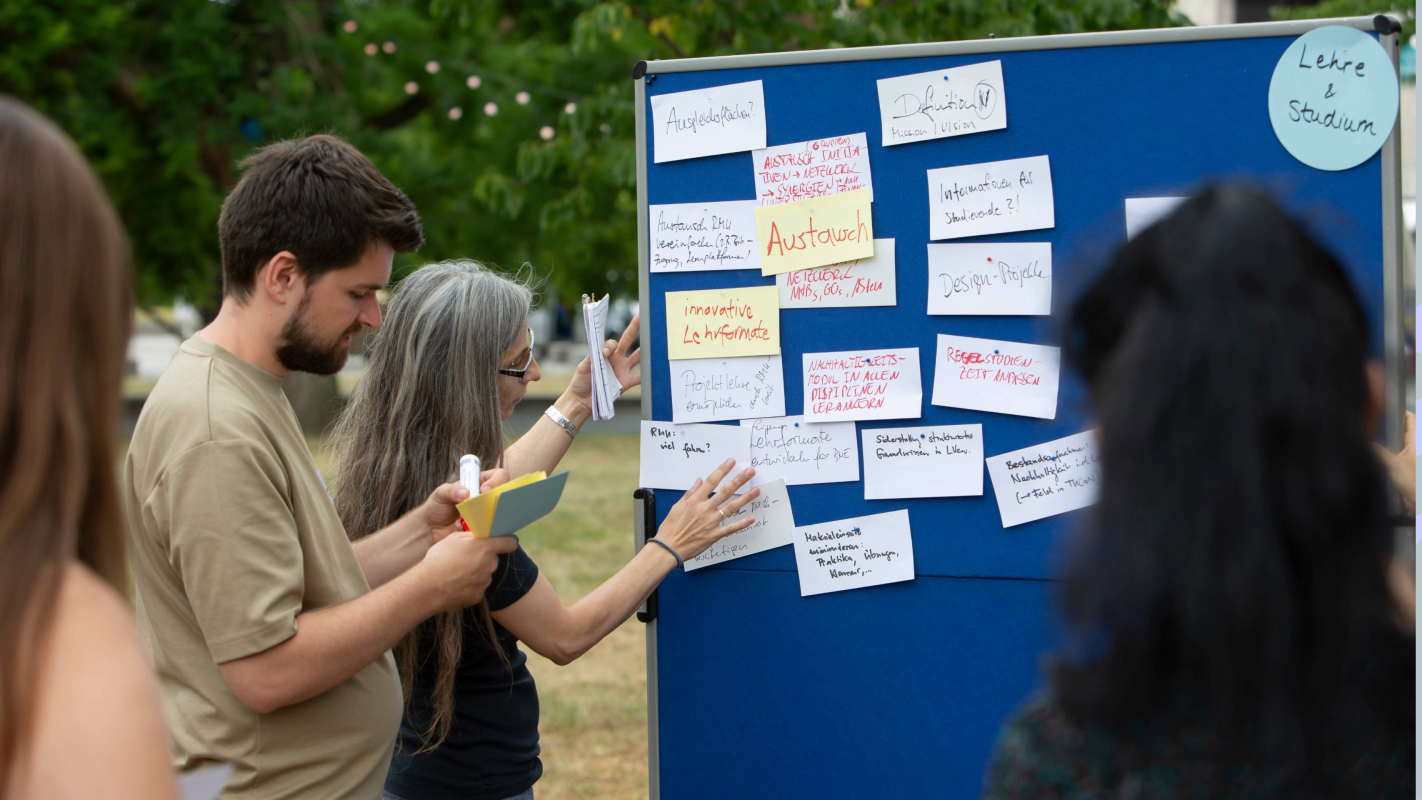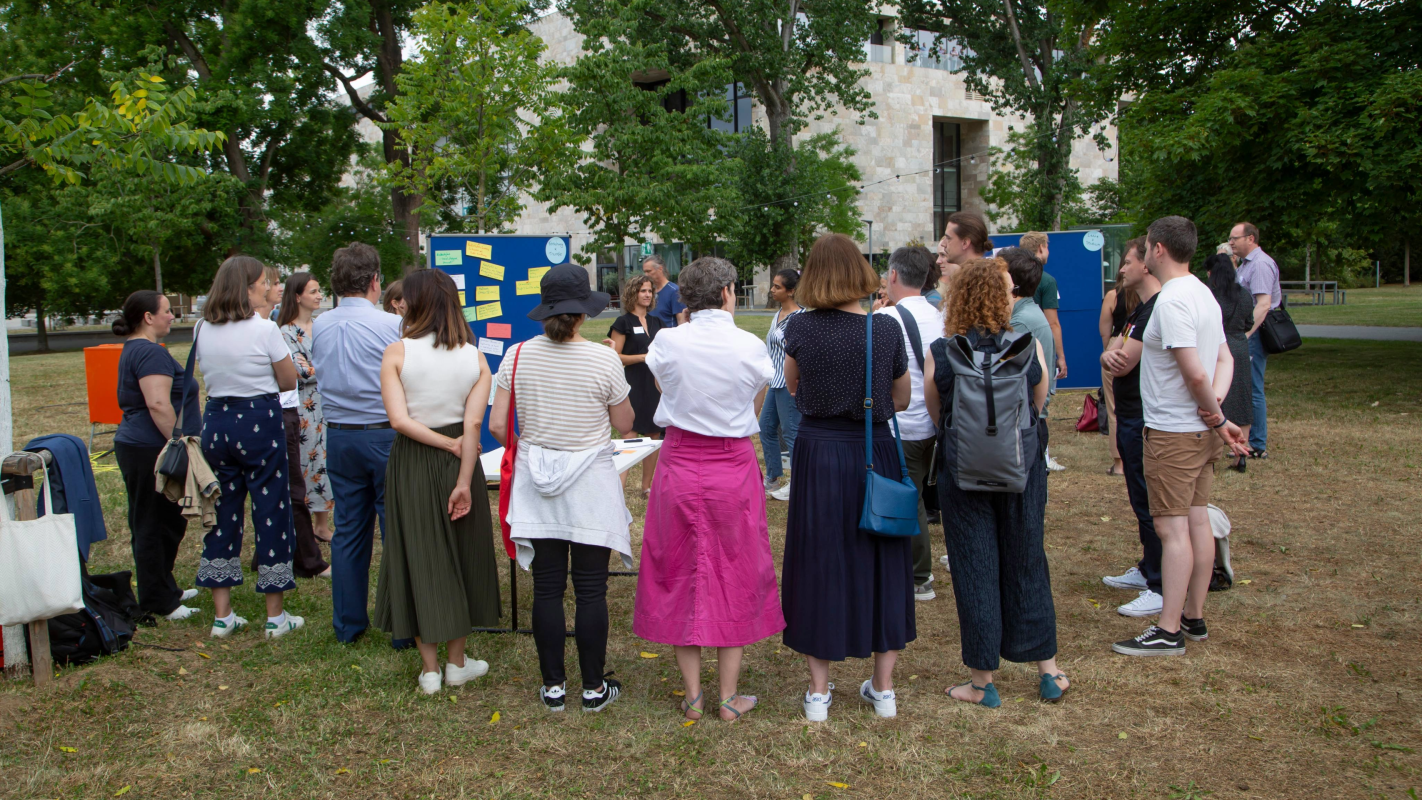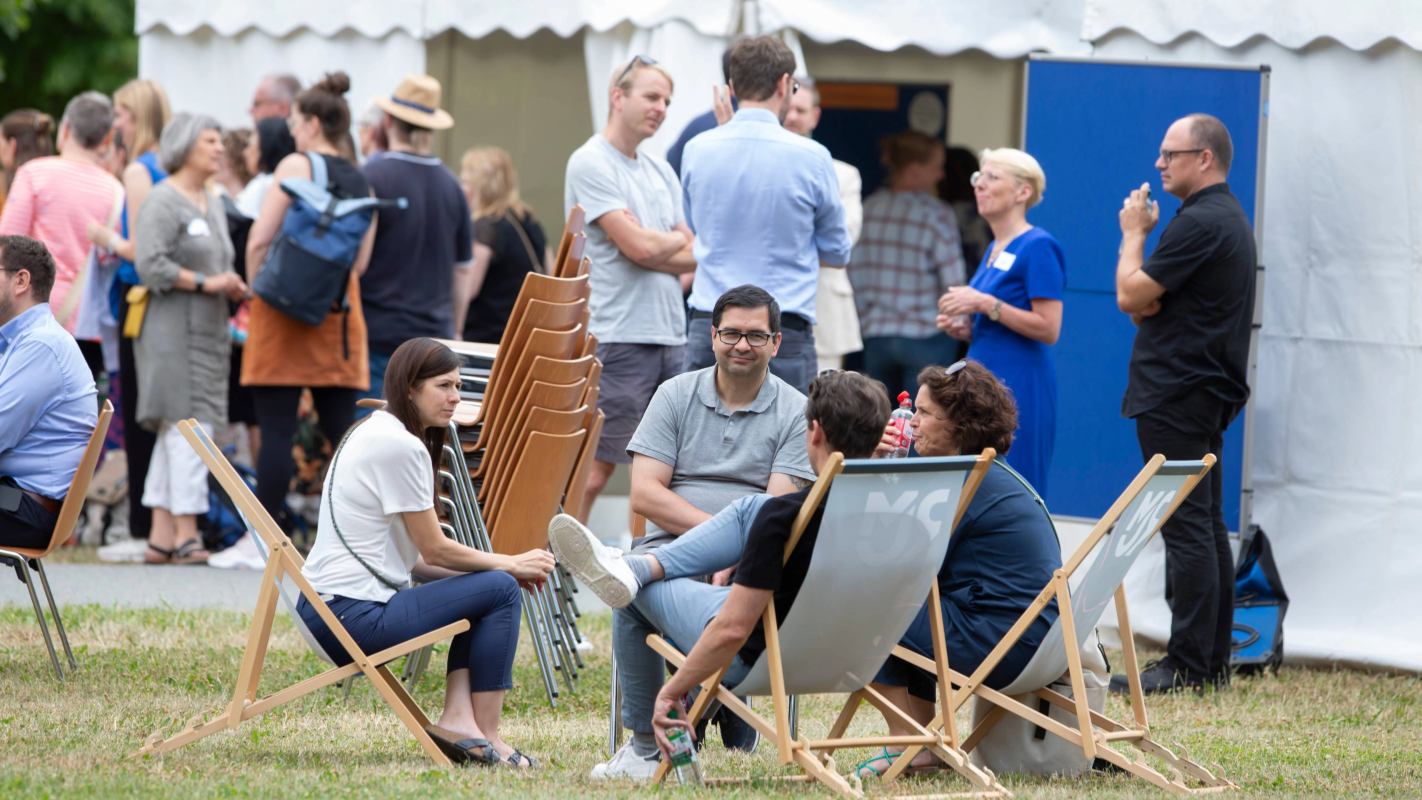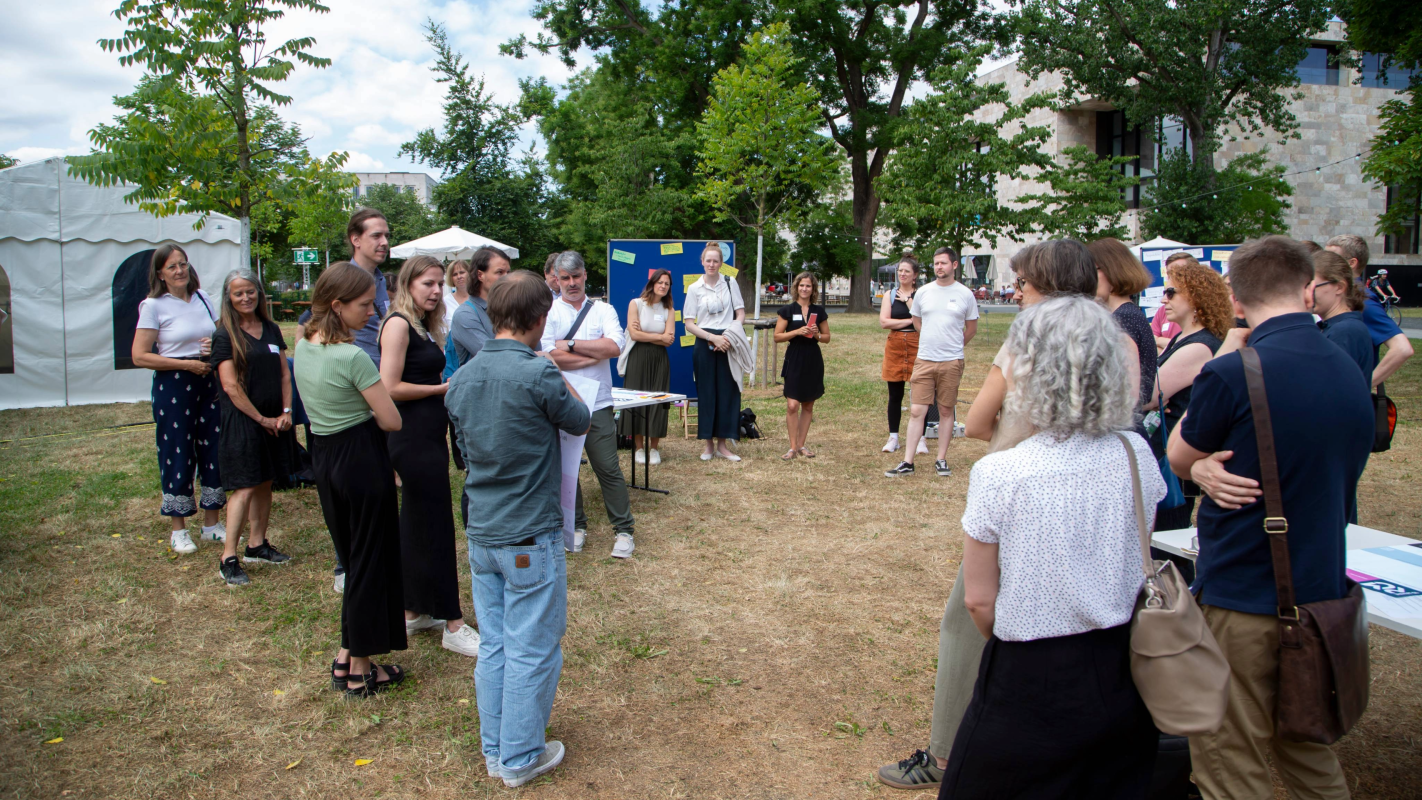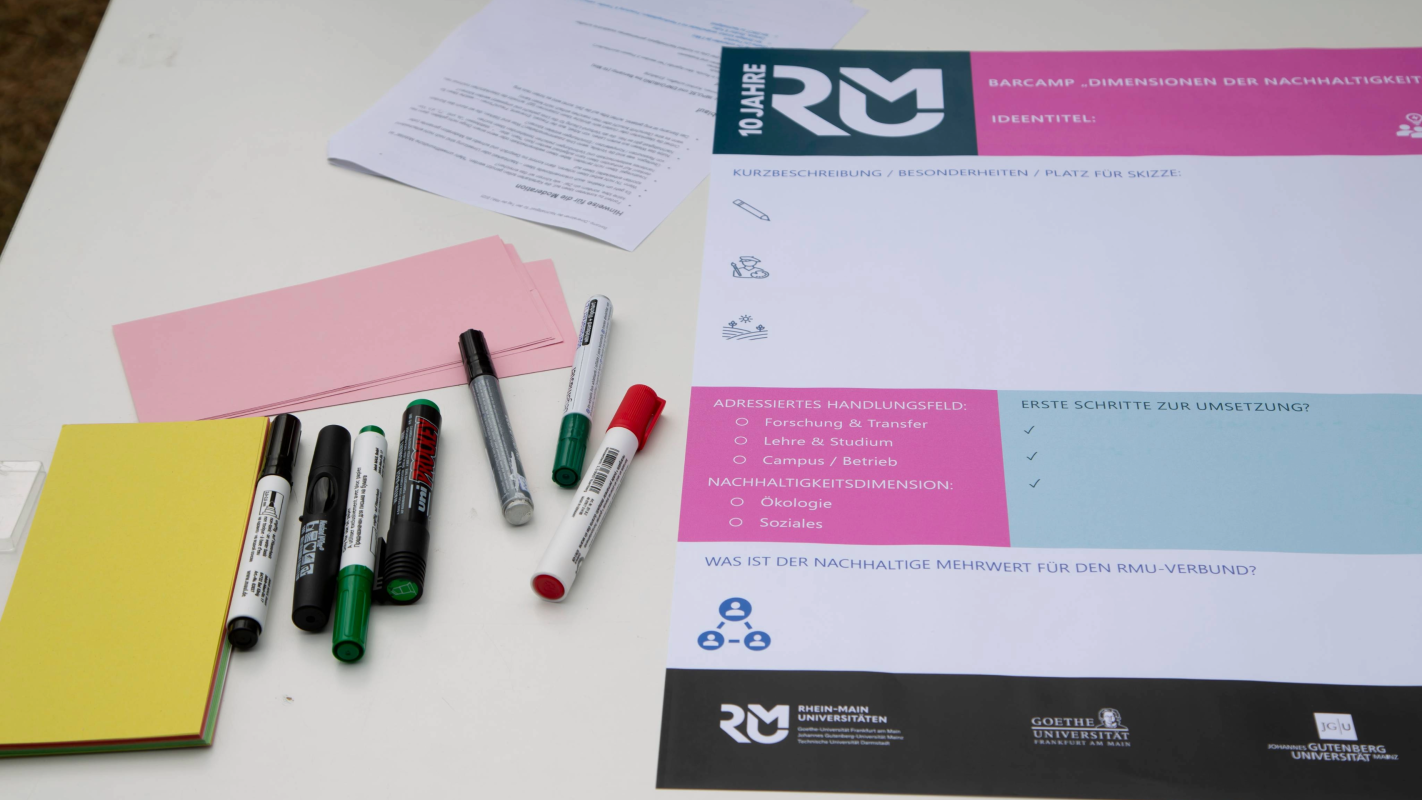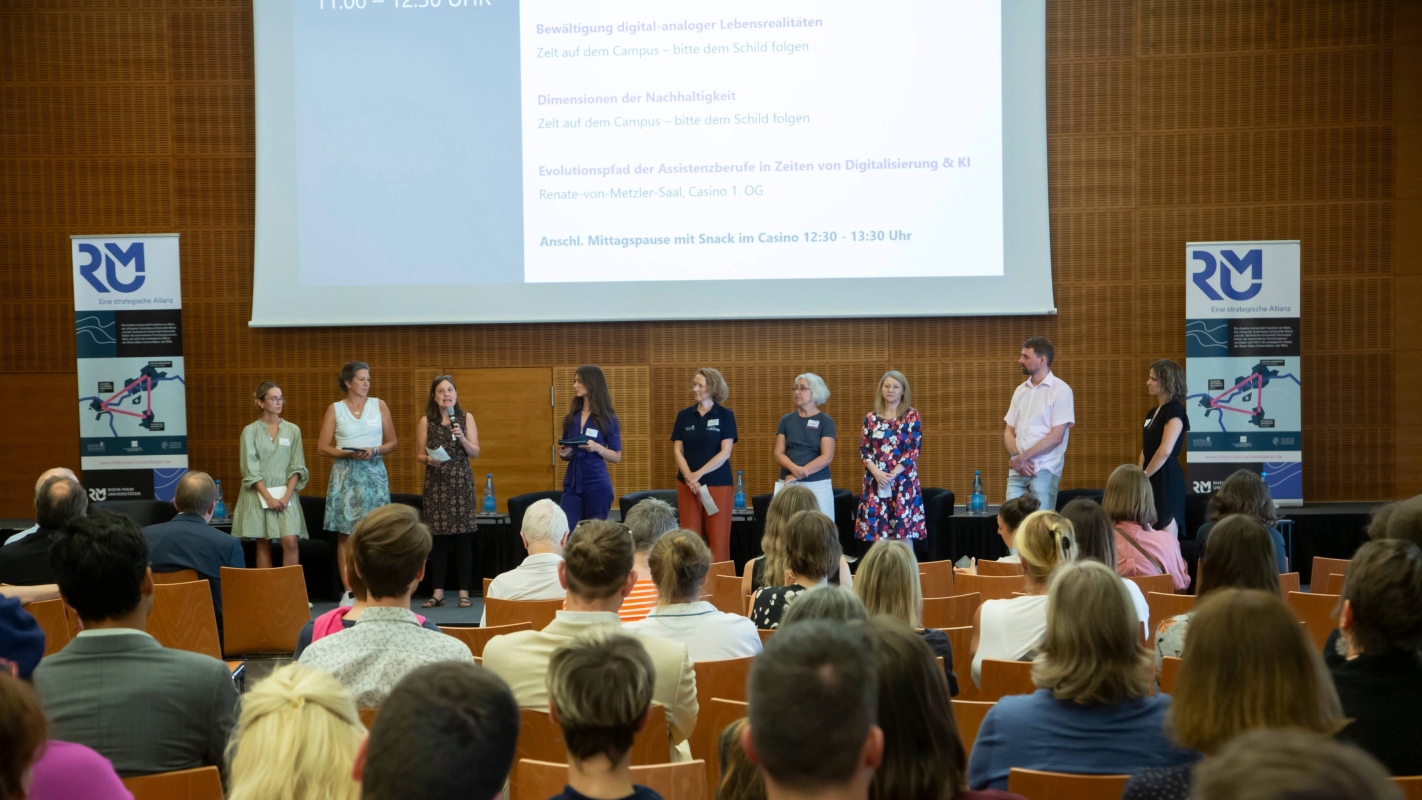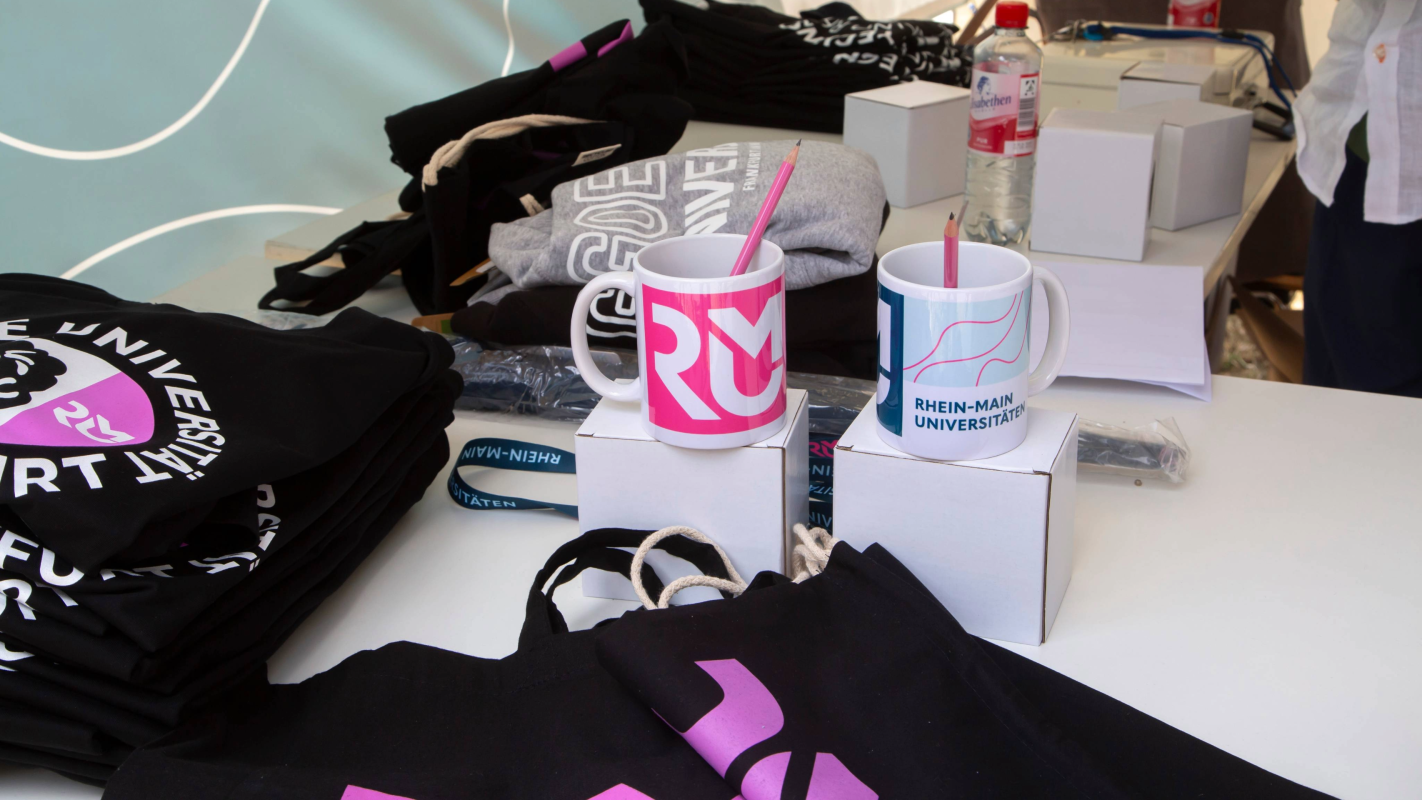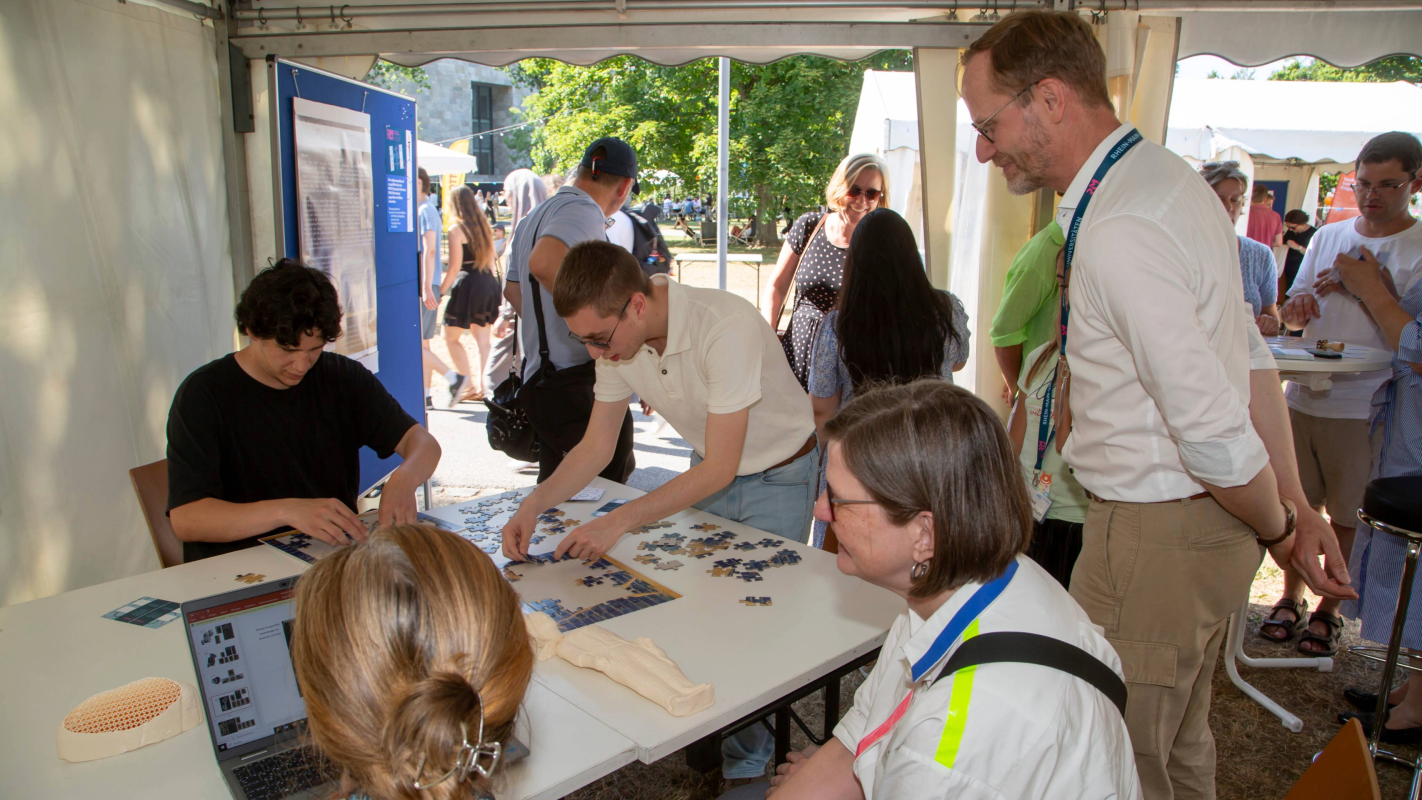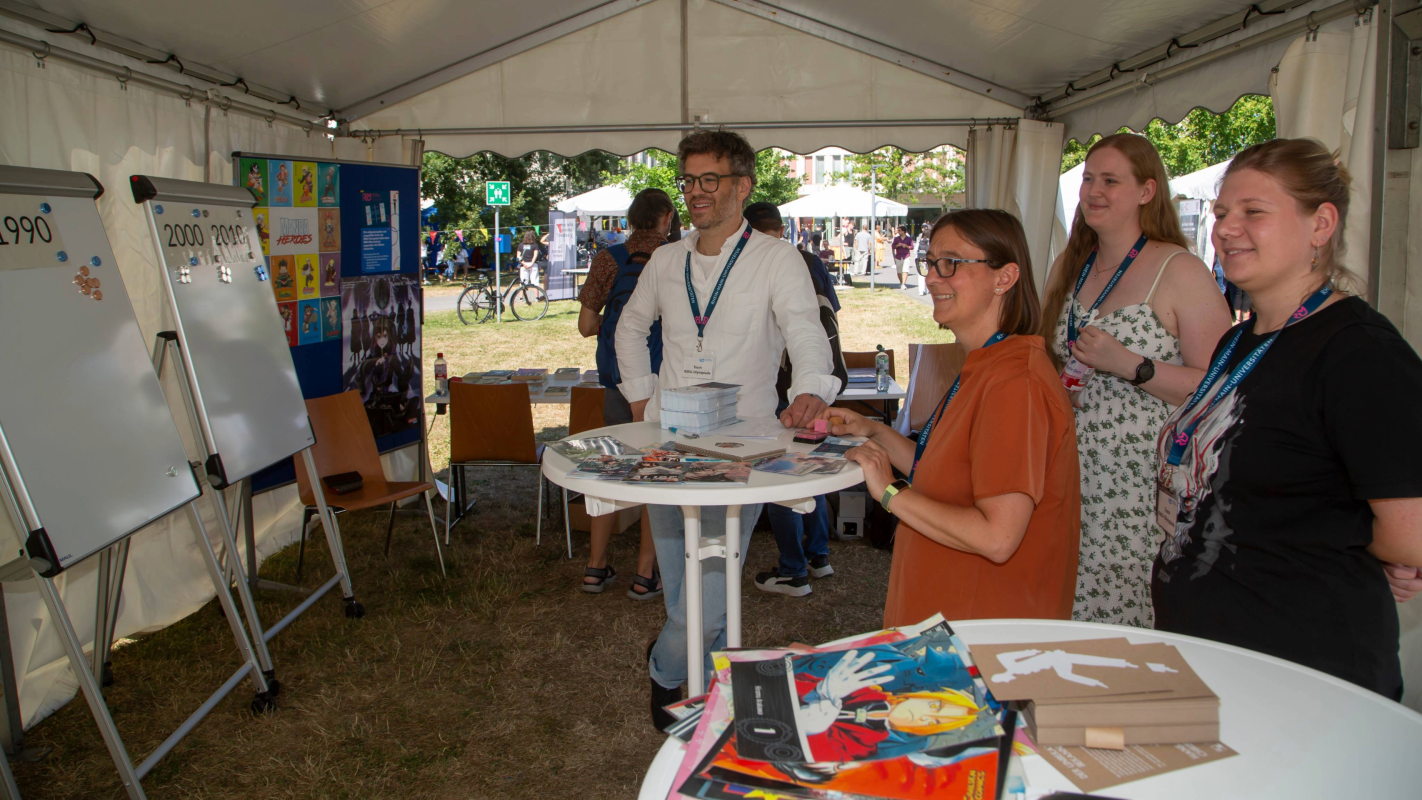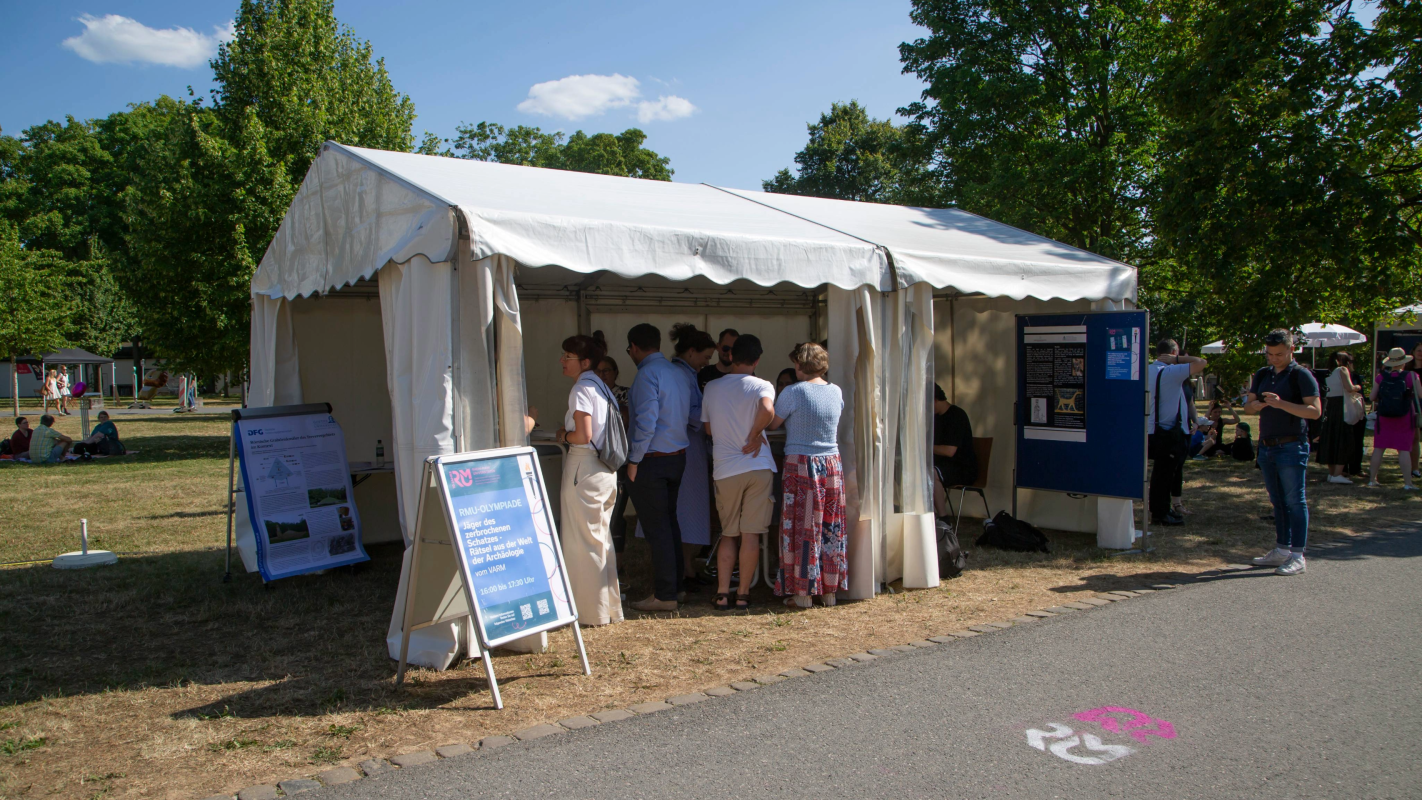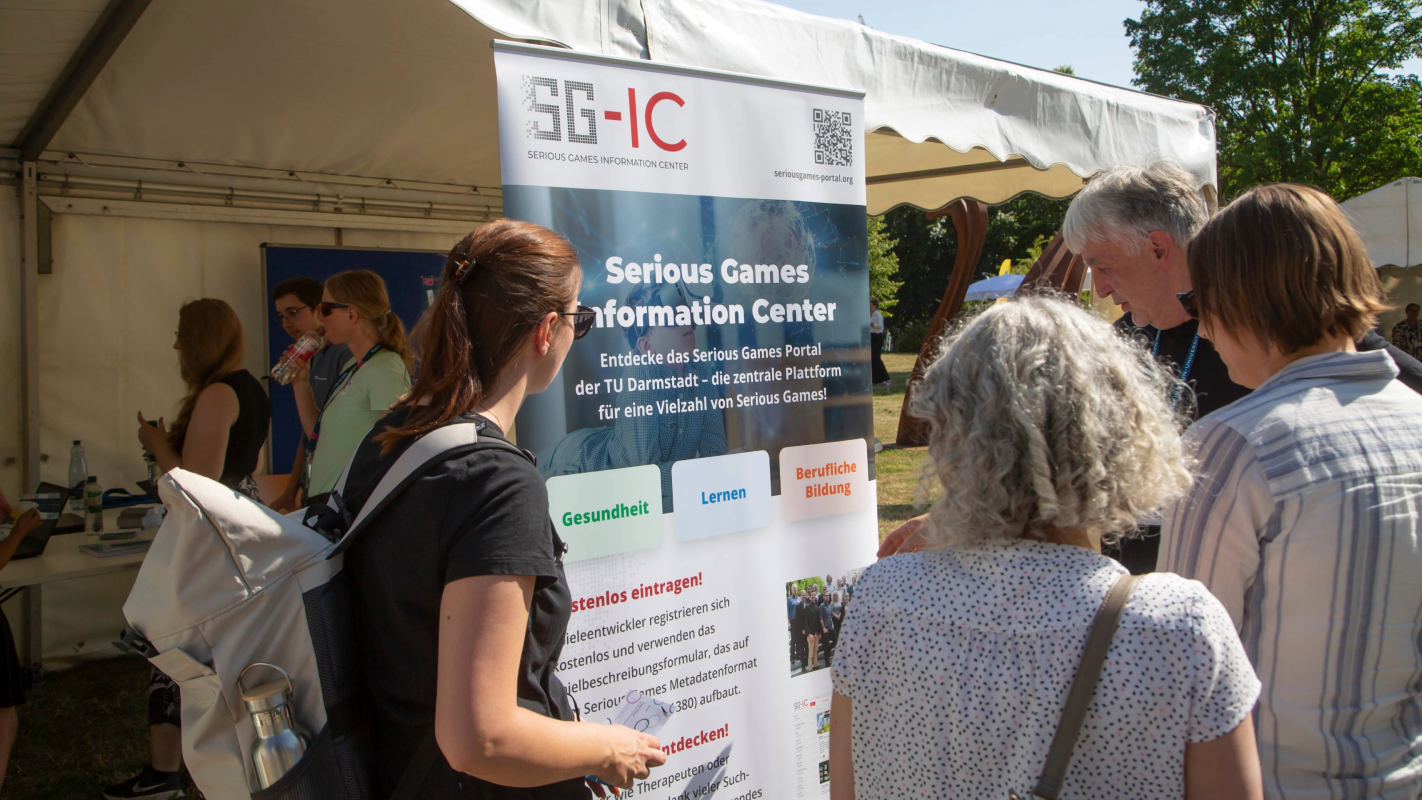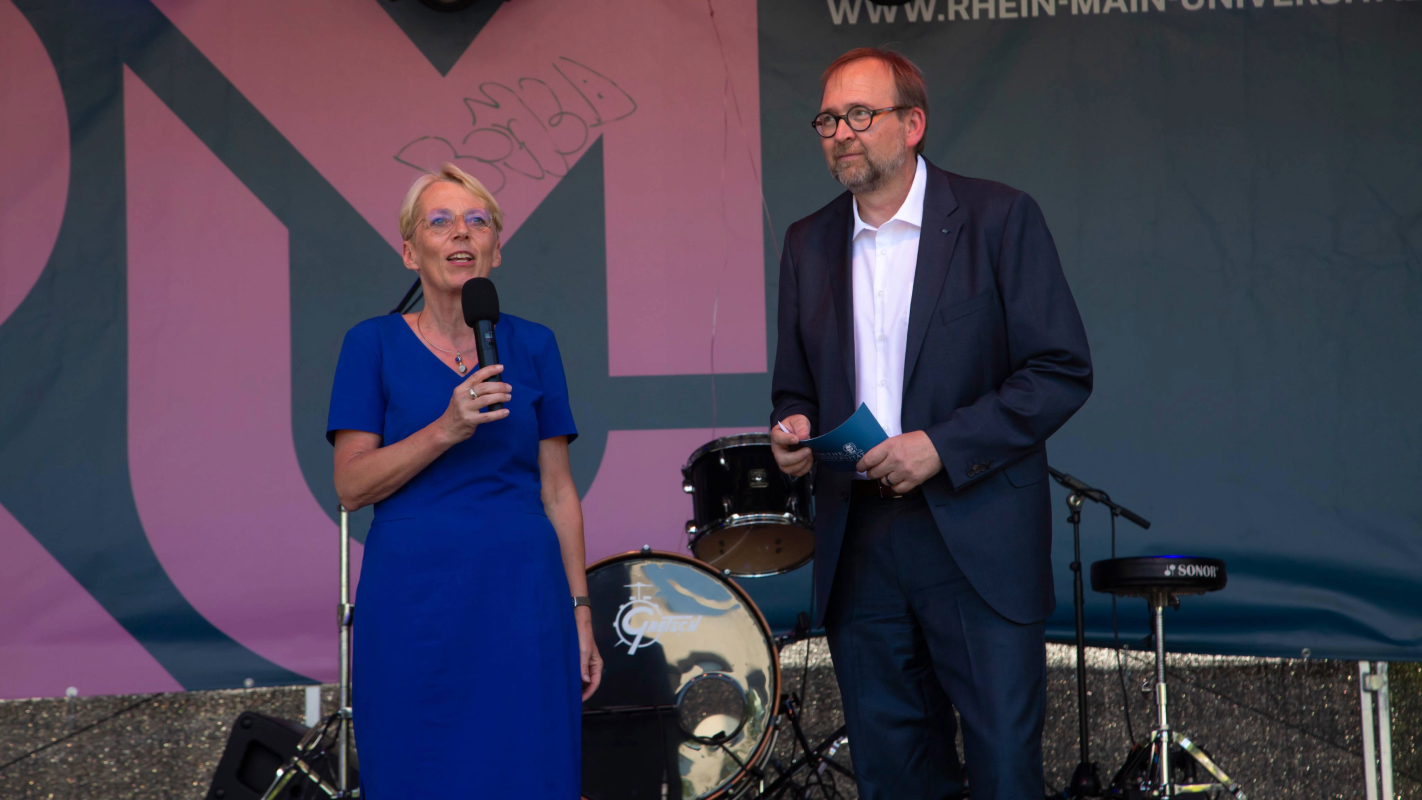Knowledge for the World of Tomorrow: the Rhine-Main Universities are celebrating the 7th RMU Day together with their 10-year-anniversary
Photos: Uwe Dettmar
Goethe University Frankfurt, Johannes Gutenberg University Mainz and TU Darmstadt celebrate a decade of their alliance and use the occasion to look towards the future: How does the alliance’s research contribute to the world of tomorrow?
Over 300 participants, more than ever before, from the Rhine-Main Universities (RMU) and guests came together for the 7th RMU Day which, this year, was held under the motto “Knowledge for the World of Tomorrow” on Campus Westend of Goethe University Frankfurt, where the RMU also celebrated its 10 anniversary at the traditional summer party of Goethe University.
Lively discussions in the BarCamps
With a view to the world of tomorrow, the program started with four parallel BarCamps on topics that were put to the vote beforehand on Instagram. More than 60 participants discussed how to cope with digital-analog realities of life, while around 50 participants attended a BarCamp on dimensions of sustainability. The topic of how to stay healthy in today’s achievement society attracted around 90 participants. The long-standing RMU assistants’ network also offered a well-attended BarCamp, where more than 60 participants discussed the evolution of the assistant professions in times of digitalization and AI. At the subsequent presentation of the results from the BarCamps, all presenters agreed that society and its members are faced with huge societal transformations that must be accompanied by science and addressed thoughtfully.
Panel discussion with the RMU Clusters of Excellence
As the RMU’s joint proposal in the Excellence Strategy of the German federal and state governments is shaping 2025 to a significant extent, this topic formed the second part of the day’s program. At a panel discussion with nine panelists, hosted by science journalist Julia Nestlen, the audience first learned about the so-called Clusters of Excellence, of which the RMU has five that will receive funding from 2026 onwards. Representatives from the clusters answered questions about their work and about the contribution of their research to the world of tomorrow. The presidents of Goethe University Frankfurt and Johannes Gutenberg University Mainz, Prof. Dr. Enrico Schleiff and Prof. Dr. Georg Krausch, as well as the chancellor of TU Darmstadt, Dr. Martin Lommel, explained how this first success in the Excellence Strategy achieved with the future Clusters of Excellence will affect the various groups within the universities and how they – and also society as a whole – will profit from this success.
Prof. Dr. Ralf Brandes of the Cluster “Cardio-Pulmonary Institute (CPI)” explained that, already today, more than 50 percent of deaths in Germany can be attributed to cardiovascular or lung diseases. In the future, people will benefit directly from the research of disease mechanisms and the development of new therapeutic principles.
Future therapies are also a component of the work of Excellence Cluster “Subcellular Architecture of LiFe (SCALE)”. Co-spokesperson Prof. Dr. Inga Hänel explained that, of course, scientists must first understand how our body’s cells build their complex structures and how these structures change as we grow older or in the case of illness. A digital twin, which is to be developed in the long-term, could be used in the future to test therapeutic options.
Prof. Dr. Kristian Kersting, co-spokesperson for the Cluster “Reasonable AI (RAI)” explained how artificial intelligence systems are to be equipped with “common sense” in order to deal more effectively with the challenges of the times. This can include, for example, handling applications and enquiries in public administration, in order to be able to process requests quickly and correctly, even if there is a shortage of staff, and to thus foster trust in the government and society.
The work of the Cluster “The Adaptive Mind (TAM)” also focuses on understanding and subsequently applying human adaptation strategies to artificial intelligence. Prof. Dr. Constantin Rothkopf, the cluster’s spokesperson for TU Darmstadt, promised that the results achieved by this project will not only answer fundamental questions of psychology and cognitive science, but will also open up new ways for individualized approaches to mental health and for establishing robust, adaptive artificial intelligence systems.
Prof. Dr. Alfons Weber, co-spokesperson of "Precision Physics, Fundamental Interactions and Structure of Matter" (PRISMA++) explained that the Excellence Cluster wants nothing less than to understand what keeps the world together on the inside. The findings on what matter is made of or what the forces of the universe are will be used to generate the knowledge of tomorrow, on the basis of which new technologies and understandings of the world will be developed.
The RMU in the Excellence Strategy
Following the overview of the specific contributions of the five Clusters of Excellence to the world of tomorrow, the presidents and the chancellor spoke about the impact that a general funding of the RMU as a consortium of excellence in the Universities of Excellence funding line of the Excellence Strategy of the German federal and state governments could have on students, teachers, researchers and staff. For example, an excellent RMU offers an ideal environment for the (career) development of all its members where everyone can learn, also from each other, as has been practiced within the RMU for years. This is why the RMU cooperates across all areas – not only in research, but also on joint study programs that one university alone could not offer, in knowledge exchange with society and not least with regard to infrastructure and administration.
Prof. Dr. Enrico Schleiff, President of Goethe University Frankfurt and current RMU spokesperson, said: “The universities have many tasks. And they all have one goal: making today’s world a bit better every day and enhancing tomorrow’s world through knowledge. For this, we have to become a bit better every day, because Germany and Europe are faced with competition on a global level: with regard to skilled professionals as well as with regard to knowledge resources, visibility and economic power. In order to be competitive as the Rhine-Main region, we must make an effort. Our contribution is to strengthen the Rhine-Main region of knowledge through our RMU as an alliance between Goethe University Frankfurt, TU Darmstadt and Johannes Gutenberg University Mainz. The Universities of Excellence funding line provides us with the opportunity to further expand our visions, strategic aims and our research excellence within the alliance. For us, the call for proposals comes at exactly the right time because we will continue to develop our RMU in the future, just as we have done in the past. The Excellence Strategy provides us with the opportunity to focus and to act more quickly.”
The official program ended with a short closing round with insights into individual conclusions and findings from the day and a preview of the upcoming months. Afterwards, President Schleiff and his colleague from Darmstadt, President Prof. Tanja Brühl, welcomed guests to the summer party of Goethe University and the RMU anniversary celebration on Campus Westend to which, of course, all participants of the RMU Day were invited as well.
Anniversay celebration at the summer party
At the summer party, guests could sample soft ice cream in the RMU colors, take pictures in the RMU photo box and visit a merch stall to browse a range of RMU merchandise that is now available for sale. Gym bags in the RMU design filled with everyday articles and t-shirts were also given out to the winners of a lottery among participants of the RMU Olympics, which were made up of four stations representing a cross section of the numerous cooperation projects within the RMU.
At the station “Manga Hitster“ organized by project ANIMARET, prospective „RMU Olympians“ had to match anime and manga figures to their correct names and dates of creation. ANIMARET is a project at Johannes Gutenberg University and Goethe University Frankfurt that is funded by the RMU Initiative Funding for Research.
The “Verbund Archäologie Rhein-Main (VARM)“ (Archaeology Network Rhine-Main) attracted antiquity fans and jigsaw buffs alike with its station “Jäger des Verlorenen Schatzes – Rätsel aus der Welt der Archäologie“.
The joint study program Biomedical Engineering of TU Darmstadt and Goethe University Frankfurt challenged participants with “Serious Games für Bildung und Gesundheit”. Physical effort was required for the “Balance Fit” game.
Futury GmbH, an innovation platform that supports prospective founders at the RMU of which all three Rhine-Main Universities have been shareholders for around three months now, focused on well-known startups: In a virtual quiz, accessible via QR code, participants were asked to match startups to their funding dates.
In the early evening, six lucky winners were selected among the numerous participants in two drawings. Everyone who participated in the RMU Olympics also received an RMU soft ice cream prepared by the Department of Physics of Goethe University.
The next RMU Day will be held at TU Darmstadt in fall 2026.
Downloads
- Pressemitteilung der RMU vom 04.07.2025 (106.08 KB)
